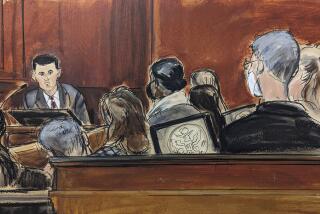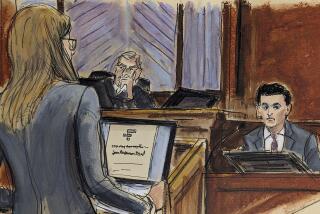Bond Sellers Got Negative Data, Ex-S&L; Chief Says : Fraud trial: Raymond Fidel tells jury he followed advice of lawyers, not Charles Keating, in deciding what information could be given investors.
- Share via
LOS ANGELES — A former Lincoln Savings & Loan president said Wednesday that he followed the dictates of lawyers and accountants--not Charles H. Keating Jr.--in determining what information could be given to small investors who bought bonds issued by Lincoln’s parent company.
Raymond C. Fidel also testified at Keating’s securities fraud trial that he personally provided bond sellers with negative information about Lincoln’s parent company, American Continental Corp.
He testified on cross-examination that he gave bond sellers copies of a 1988 Forbes magazine story that harshly criticized the company’s bond program. He said he provided the company’s response to the story if customers asked about it.
Fidel, who was in charge of bond sales, blamed himself for not providing information to bond sellers in late 1988 and early 1989 about the deteriorating financial state of Lincoln and American Continental.
“Our (sales) program never changed, but the company’s condition changed. And we did not change our verbal presentations to reflect that,” he said. But the bond packages containing written information often changed, he said.
While the lawyers determined what written materials were to be provided to customers, Fidel said he sometimes decided himself what information to give to bond sellers.
Fidel’s testimony tended to blunt some of the damaging evidence he provided to the Los Angeles County Superior Court jury Tuesday under questioning by prosecutors. His testimony the previous day painted a picture of Keating as a man who controlled Lincoln and recklessly pushed the bond sales in spite of mounting evidence that the company was in trouble.
His testimony Wednesday also seemed to bolster the defense contention that Keating, American Continental’s chairman, hired top lawyers and accountants to develop and oversee the bond sales program.
Thousands of small investors lost more than $250 million after the Phoenix company went bankrupt and federal regulators seized the Irvine thrift in April, 1989. Regulators say the S&L;’s failure will cost taxpayers $2.6 billion. It is the most costly thrift failure to date.
Keating is accused in 20 counts of defrauding 22 small investors. As part of a plea bargain last March, Fidel pleaded guilty to six counts of securities fraud. He also pleaded guilty to two federal securities fraud charges and agreed to help federal prosecutors in their continuing investigation of Lincoln’s collapse.
Fidel, who was involved with the bond program from its start in late 1986, said he began to feel uncomfortable with it by Oct. 1, 1988, when he learned that the company might have to take a substantial loss. Bond sellers weren’t aware of the quarterly results until the company announced a $36-million quarterly loss six weeks later.
Keating, he said, continued to emphasize bond sales and never told him to pass information about the company’s faltering financial condition to bond sellers. Fidel said he also was not told to pass along details of restrictions imposed by regulators and Keating’s own view that the sale of Lincoln was crucial to the survival of American Continental.
But Fidel acknowledged that all that information was included in a December, 1988, press release, which was among the materials given to customers before they bought bonds.
The materials included a prospectus that, by law, must disclose all material information, including any negative developments. Fidel said he didn’t know if Keating was involved in preparing the prospectus.
The prosecution is expected to rest its case today. Two bondholders are too ill to testify, so two counts are expected to be dismissed. The defense is also expected to seek a dismissal of the entire case based on its contention that the prosecution failed to link Keating to any misrepresentations.
More to Read
Inside the business of entertainment
The Wide Shot brings you news, analysis and insights on everything from streaming wars to production — and what it all means for the future.
You may occasionally receive promotional content from the Los Angeles Times.










